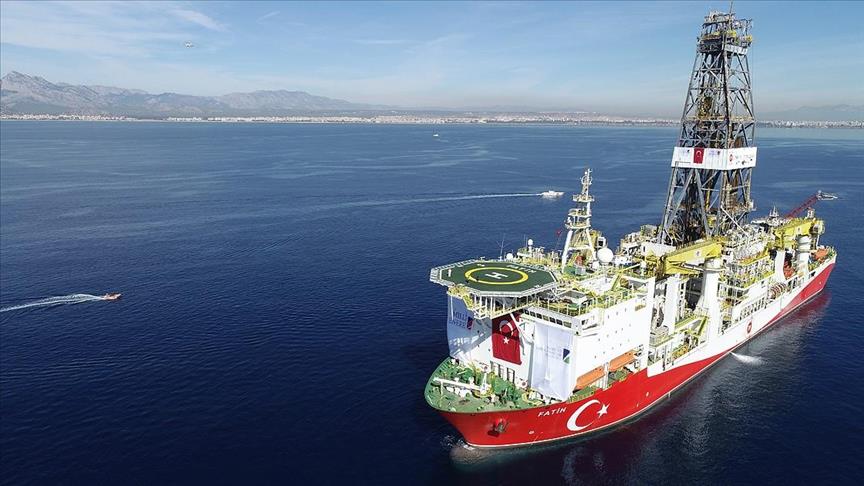A potential partnership between Turkey and Egypt in the Eastern Mediterranean would open new doors for maritime rights and tender participation for both sides in the region, experts told Anadolu Agency on Friday.
Turkey and Egypt have recently released statements on bilateral ties, suggesting an expected restoration in relations after more than seven years of political estrangement.
The two countries exchanged positive signals on establishing contacts and dialogue, including the possibility of holding talks to demarcate their maritime borders in the Eastern Mediterranean.
'It is possible that Turkey and Egypt sit at the table with regards to their mutual interests in the near future,' Cihat Yayci, retired rear admiral and associate professor and director of Bahcesehir University Maritime and Global Strategies Center said.
Yayci said the two countries have many potential cooperation areas that would serve their mutual interests, with the economy, security and maritime zones topping the list.
He stressed that Egypt's recent move in the Eastern Mediterranean by acknowledging Ankara's rights in the region could be considered as an intention to develop good relations with Turkey.
Yayci noted that Egypt announced a bid round for hydrocarbon exploration in block 18 in the Eastern Mediterranean, which considered Turkey's continental shelf rights, while Greece claims that block 18 is located in its exclusive economic zone.
Regarding the agreement between Egypt and the Greek Cypriot administration in 2003, Yayci affirmed that it violates the principle of proportionality of international law, considering Egypt's wide coastal length compared to that of Southern Cyprus.
'If Egypt chooses to make a deal with Turkey for delimitation [in the Eastern Mediterranean] instead of the Greek Cypriot administration, then it will add 11,500 square kilometers of the maritime zone, which is more than the acreage of the Cyprus island,' he explained.
On the other hand, the country will lose 15,000 square kilometers of its maritime zone if it enters into a deal with Greece, according to Yayci.
'Turkey and Egypt share similar rights and interests. Therefore, it is important and necessary that they sign a deal with countries that have the longest coastlines in the Eastern Mediterranean. That way, the two countries will have maritime zones and therefore energy resources of their due share. They will also have effective power in the Eastern Mediterranean and global energy markets thanks to good relations and cooperation that will be developed,' he asserted.
A delegation of senior Turkish diplomats is expected to pay Egypt an official visit early in May, according to Turkey's foreign minister on Thursday. Mevlut Cavusoglu said Egypt had invited a Turkish delegation at the deputy foreign minister-level for the visit.
- Turkish energy companies to join bids in Egyptian waters with potential deal
The Cairo-Ankara axis will widen horizons for both countries, including the participation of Turkish companies in tenders for hydrocarbon explorations in Egyptian waters, and energy technology exports to Egypt, according to Mohammad Suleiman Al-Zawawy, an Egyptian lecturer in Sakarya University’s Middle East Institute.
In this case, nobody will have to sign unfair contracts with Western companies that take the lion's share of the energy market, he said.
This is pertinent for Cairo, which is dependent on Western technology for hydrocarbon exploration as opposed to Turkey, which is more self-reliant in utilizing its own infrastructure and capabilities without recourse to foreign companies.
Moreover, a long-awaited maritime deal between the two countries would also hamper the EastMed Pipeline. This project plans to bring Israeli and Cypriot gas supplies under the Mediterranean to Greece and the European Union by violating blue borders of Turkey, Egypt and Libya, he added.
'In line with this, we can talk about a switch in Egypt's policy due to the disadvantages of the EastMed Pipeline project, and the whole equation in the region could be reshaped, if Cairo changes alliances that it has built over the last 10 years in the Eastern Mediterranean,' Al-Zawawy said.
Under this scenario, Egypt, which is not a partner in the pipeline, has two options; to transport its gas to Europe via tankers by liquefying at LNG terminals, or to realize the Arab Gas Pipeline project built to export Egyptian gas to Jordan, Lebanon, and Syria and extended to the Turkish border.
Nevertheless, the first option is costly for Egypt and hinders Cairo's goal of becoming an energy hub, while the second option ensures that Egypt can transmit gas to Turkey, a major energy consumer, and onto Europe via Turkey.
According to Al-Zawawy, Ankara and Cairo should work together to evaluate this option, although he said there are other obstacles to the Arab Gas Pipeline.
In the Eastern Mediterranean, he said other developments that support the formation of a new axis between Cairo and Ankara came in the form of the United Arab Emirates' agreement on a line connecting Israel's Ashkelon Port with the Gulf, bypassing the Suez Canal, which dealt a big blow to Egypt by favoring the Israeli energy sector.
By Busranur Begcecanli and Ebru Sengul Cevrioglu
Anadolu Agency
energy@aa.com.tr


